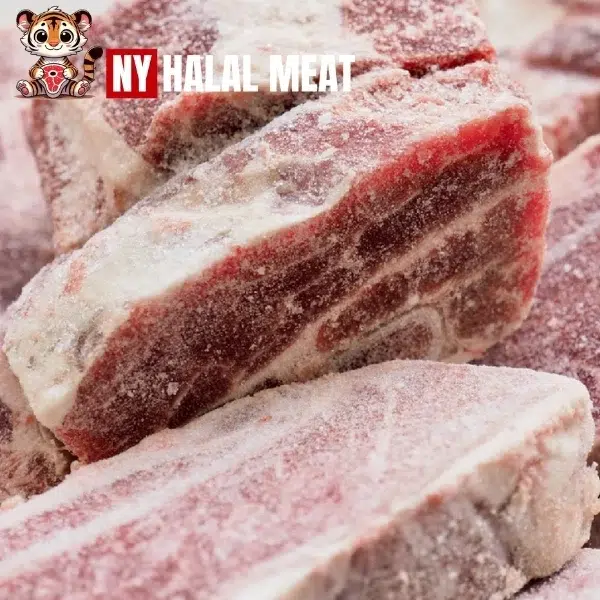Frozen vs. Fresh Meat: What to Expect from Online Orders
What is Fresh Meat?
Fresh meat refers to meat that has not been frozen and is typically delivered within a short time frame after slaughter. It is stored in a refrigerated environment to maintain its freshness, often with the goal of being consumed within a few days of purchase. Fresh meat is typically considered the best option when you are preparing dishes that rely on tender, juicy cuts.
What is Frozen Meat?
Frozen meat, as the name suggests, has been chilled to below freezing temperatures, usually at or below 0°F (-18°C). Freezing preserves the meat for a longer time by slowing down the growth of bacteria and reducing spoilage. Frozen meat can be kept for months and is often preferred for long-term storage or bulk purchases.
Key Differences Between Fresh and Frozen Meat
1. Shelf Life and Storage
- Fresh Meat: The shelf life of fresh meat is relatively short, typically ranging from a few days to a week, depending on the type of meat. Fresh meat must be kept refrigerated to prevent spoilage.
- Frozen Meat: Frozen meat, on the other hand, can be stored for several months. Freezing helps to maintain the meat’s quality, allowing you to keep it in your freezer until you’re ready to cook.
2. Taste and Texture
- Fresh Meat: Fresh meat is often considered superior in terms of taste and texture. Because it hasn’t undergone freezing, it retains its natural moisture and tenderness, which is especially important for certain cuts of meat like steaks and roasts.
- Frozen Meat: Freezing meat can alter its texture slightly. While it preserves the flavor, frozen meat can sometimes lose moisture, resulting in a drier texture once it’s thawed and cooked. However, when handled properly, frozen meat can still be flavorful and tender.
3. Convenience and Availability
- Fresh Meat: Fresh meat is widely available at local markets and butcher shops, but it must be used relatively soon after purchase. This makes it ideal for those who plan to cook within a short time frame.
- Frozen Meat: Frozen meat is more convenient for those who prefer to stock up on meat for future use. By buying frozen, you can store a variety of cuts for months and have them available whenever needed.
4. Nutritional Value
- Fresh Meat: Fresh meat may retain more of its nutrients since it hasn’t been subjected to the freezing process. However, the loss of nutrients during storage is typically minimal in both fresh and frozen meat.
- Frozen Meat: Freezing meat can result in slight nutrient loss, but most of the essential nutrients, such as protein, remain intact. Proper freezing techniques ensure minimal degradation of nutrients.
5. Price
- Fresh Meat: Fresh meat can often be more expensive than frozen meat due to its limited shelf life and the need for quicker transportation. Local butchers may charge higher prices for fresh cuts.
- Frozen Meat: Frozen meat tends to be more affordable, particularly when bought in bulk. The cost of freezing and longer storage times contribute to the lower price, making it a more economical choice for long-term storage.
What to Expect When Ordering Fresh Meat Online
1. Delivery Process
Fresh meat ordered online is typically shipped in insulated boxes with ice packs to ensure it stays cool during transit. Many online stores prioritize quick delivery for fresh meat to maintain its quality.
2. Shelf Life
Fresh meat has a shorter shelf life and should be consumed soon after delivery. Be sure to plan meals accordingly and use or freeze the meat promptly.
3. Shipping Costs
Due to the need for refrigerated packaging and fast shipping, fresh meat may have higher shipping fees compared to frozen options.
What to Expect When Ordering Frozen Meat Online
1. Delivery Process
Frozen meat is shipped in insulated packaging with dry ice or gel packs to keep it frozen during transit. It is less sensitive to shipping delays than fresh meat, which means longer delivery times are generally acceptable for frozen products.
2. Shelf Life
Frozen meat has a much longer shelf life than fresh meat, allowing you to keep it in your freezer for months. It’s a great option for stocking up and having meat available whenever needed.
3. Shipping Costs
Frozen meat may have lower shipping costs compared to fresh meat, depending on the size and distance of the delivery. While it requires special packaging to maintain its frozen state, frozen meat is often cheaper to ship in large quantities.
Choosing Between Fresh and Frozen Meat

Choosing fresh or frozen meat depends on your priorities, meal planning habits, and the type of dishes you want to prepare. If you value superior taste and texture, and you plan to cook the meat soon after receiving it, fresh meat may be the better choice. On the other hand, if you prefer the convenience of bulk purchasing or longer storage times, frozen meat is an excellent option.
Conclusion
Both fresh and frozen meat have their advantages, and your choice ultimately depends on your specific needs. Fresh meat offers the best taste and texture, but it requires quicker consumption. Frozen meat, on the other hand, provides the convenience of longer storage and can be a more affordable option. Understanding the key differences between these two types of meat will help you make a choice that aligns with your preferences, budget, and cooking plans.



[…] Types of Flash-Frozen Halal […]
[…] Freddy’s Frozen Custard & Steakburgers Halal in the […]
[…] Meat and Retro Trends: 90s-Style Frozen Ready Meals for NYC […]